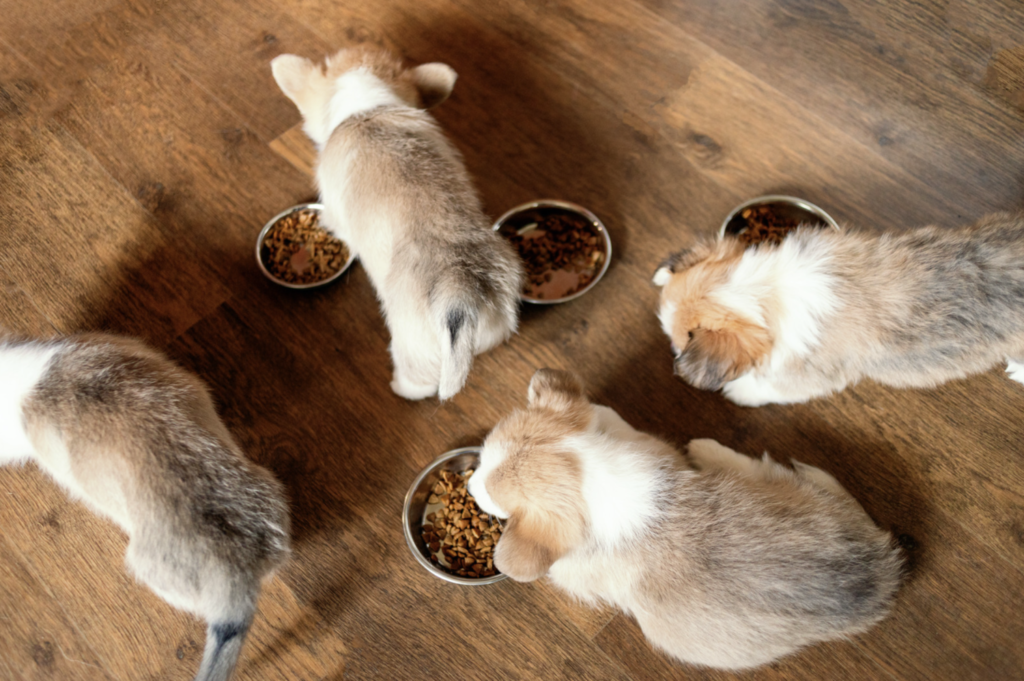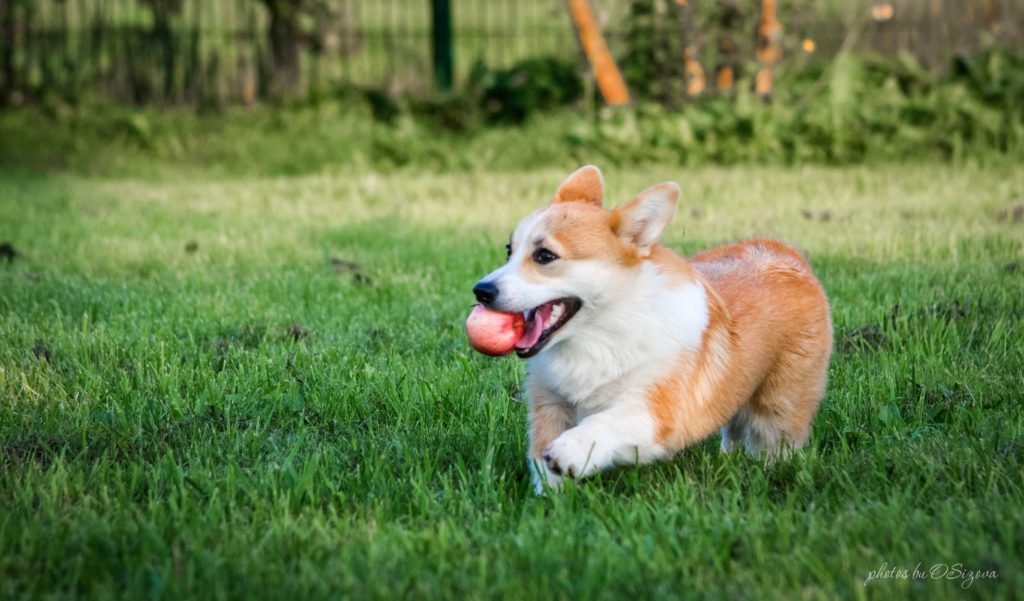The core of raising a healthy/happy puppy starts by feeding the right food, with the right proportions, at the right time. Initially, feeding your puppy may seem pretty straightforward, but there’s more to mealtime than many new pet parents realize.
What should eat puppy?
First and foremost, puppies should only be fed puppy food: a diet specifically formulated for their unique nutritional needs. Puppies are building bone, developing muscles, and growing organs at an exceptionally fast rate. Their bodies are burning a ton of energy (i.e. calories) every day. On average, a puppy requires twice as many daily calories as an adult dog of the same weight.

Along with a high-calorie requirement, puppies also have unique nutritional needs. For example, puppies require a specific amount of calcium in their diet, otherwise, they can develop metabolic bone disease or orthopedic conditions like early-onset arthritis.
This is why it is important to provide your puppy with specialized food that is both calorie-dense and nutrient-rich to ensure they are getting adequate nutrition from their food.
Do not feed your puppy with adult dog food!
Feeding a puppy adult dog food will deprive them of the essential nutrients necessary for them to grow and develop properly. Doing so could lead to serious health problems later on in life.
Can I make puppy food at home?
Feeding puppies fresh raw materials can be very beneficial, but is labor intensive and requires specific expertise. However, as I said before, I do not recommend doing this. Puppies have a very specific set of nutritional requirements that will be very difficult to meet when preparing a puppy meal at home. Do-it-yourself for a puppy is just a recipe for disaster.
Should I change my puppy’s food?
When a puppy arrives at their new home (around 10 weeks old) they are already used to eating solid food and not using their mother’s milk. Leave them on their current diet at least for now. It will be a huge mistake to change your food immediately.
Remember that your puppy has just been separated from his current family and the only environment he has known so far. He can be scared, overwhelmed and stressed (even if he doesn’t show it on the outside). Food will be the only permanent element of his life during this adaptation period. Don’t take it back.
If you want to change your puppy’s food, I personally recommend starting this transition 8 weeks after the day he comes to live in your home. This should give your puppy enough time to acclimatize to your home and allow a stress-free transition from one food to another. I also recommend that you follow the 7-day schedule for switching to a new one.
How should I feed my puppy?
It depends on the puppy, there is no one size fits all when it comes to a puppy’s nutritional needs. Fortunately, a lot of research has been done on this topic, and there are several reliable ways to ensure your puppy has everything he needs.
First, there’s a common misconception that a puppy needs to be fed more when it’s bigger. This is simply not true.
“To promote normal growth, most puppies require the same amount of calories from around 4 to 12 months of age. Even though they get bigger, they use fewer calories to grow with age. ”
How much food will your puppy get each day?
The ideal serving size for your puppy depends on his metabolism, activity level and body composition. Once your breeder has given you a starting point for your puppy’s daily amount of food, you’ll likely need to make some minor adjustments. This will be due to different living conditions in your home, e.g. the puppy will be alone without his brothers and sisters, so he will probably spend more time sleeping, your house may be, for example, warmer than the breeder’s house, etc. This will make you had to increase or decrease the amount of feed given in one day. The most important thing during this period is constant monitoring of the puppy’s condition. At the time of the meeting, the breeder will certainly explain to you what the optimal condition should be.
How often should I feed my puppy?
2 months – 3 months: the first months of the puppy are fast growing. To support rapid growth, your puppy will need to eat regularly. Dietary restrictions at this age may cause irregular growth and may have future consequences. At this age, puppies should be fed at least 3 times a day.
4 months – 6 months: we still keep giving 3 meals a day unless the puppy has a less appetite or in summer when the temperatures are high. Then we can reduce the frequency to d2 meals a day. Feeding your puppies frequently makes it easier for them to digest the food and helps them maintain a constant energy level throughout the day.
The most important thing to do at this stage is to carefully monitor your puppy’s body condition. Dogs at this age can easily (and quickly) become overweight if overfed.
6 months -12 months: at 6 months of age, you can switch to 2 meals a day. At this point, the dog’s body has matured enough for its metabolism to be based on two feedings.
If you choose to feed your dog twice a day, make sure there is no more than 12 hours of rest between breakfast and dinner.
When should I stop giving puppy food to your corgi?
Once your puppy reaches physical maturity, they will no longer need puppy food that is high in energy and high in macro and micronutrients. This happens at different times depending on the breed of dog. In the case of Corgi, this usually happens around the age of one year.
So what’s next? “What should I feed my dog now?”
First of all, don’t keep your dog on puppy food. As you already know, puppy food is extremely high in calories and nutrients. This can lead to severe overfeeding, obesity, and can cause other health problems in the long term in an adult dog. When switching from puppy food to adult dog food, I recommend sticking to the same brand. This will generally make the dog’s transition easier. Always SLOWLY get your dog used to the new food. First as a treat and then mixing it more and more with the current food.

In the end
The journey from puppyhood to adulthood is fun, exciting, but also crucial to your dog’s future development. One of the most important factors in your puppy’s development is what they eat and the way you feed them.
Puppies should ALWAYS be fed puppy food or professionally prepared homemade food.
After our young welsh corgi pembroke is 6 months old, and in fact when our puppy changes his teeth, we can try to introduce natural, fresh products, first as a treat and then as part of the basic diet. It can be fresh meat, white cheese, boiled vegetables.
After they reach adulthood, they should receive food for adult dogs or special food depending on their needs resulting from the lifestyle, e.g. dogs working in agility or dogs working as shepherds should receive food with an increased energy content.
I wish you Bon appetit 🙂